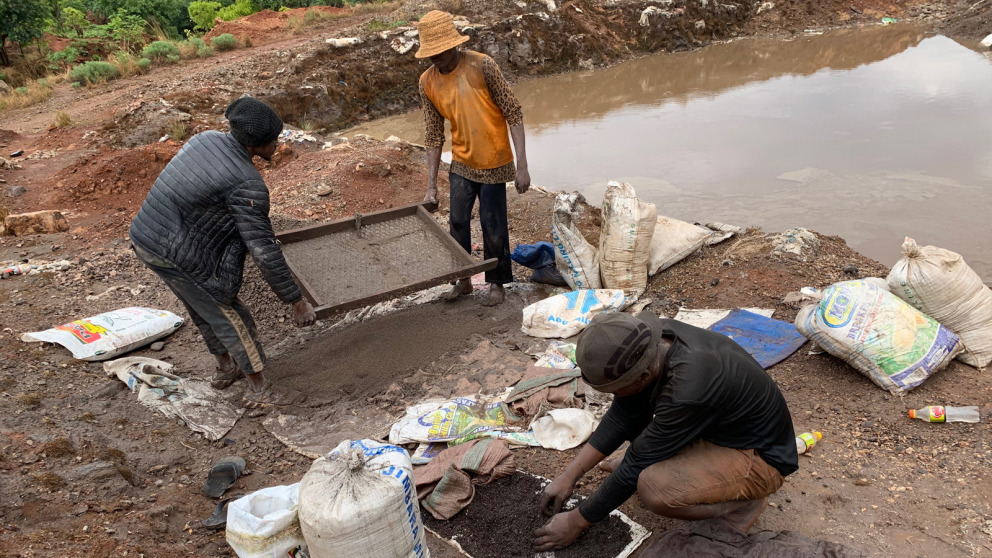Broad Participation Needed to Transform Mining for a Sustainable Future
05.05.2022
Metals such as cobalt and lithium play a vital role in the energy transition and are used in the manufacturing of solar panels, wind turbines, and electric vehicles. However, the mining of these raw materials is environmentally harmful, working conditions are often hazardous, and local communities are frequently excluded from the planning and operation of mines. In a new article, an international research team led by IASS Scientific Director Ortwin Renn describes how current mining practices could be improved and the sourcing and management of metals better aligned with the goals of sustainable development.

“We anticipate that the mining of metals will remain a necessity. However, it is possible to significantly reduce the negative environmental, economic, and social impacts with effective policy instruments. It is important to involve a wide range of stakeholders in order to gain a comprehensive overview of the impact of mining activities on people and the environment,” says Ortwin Renn.
According to the authors of the study, the mining sector can offset some of its negative impacts through compensation measures. High sustainability standards should be applied in the sourcing of raw materials and recycling systems should be significantly strengthened in order to promote an efficient and market-based circular economy. A more sustainable extractive industry would provide a cornerstone for the fulfilment of the United Nations Sustainable Development Goals, for example, by supplying key raw materials for building infrastructure (SDG 9) and the production of wind and solar technologies (SDG 7).
It is clear, however, that mining will never be able to achieve all the goals of sustainable development, such as eliminating the use and consumption of non-renewable raw materials. In light of this, the authors recommend that changes should be guided by the concept of “weak sustainability”, which focuses on achieving ambitious yet realistic targets. This approach allows for the use of non-renewable resources if this contributes to other sustainability goals such as renewable energy generation.
Pursuing sustainability across many levels
Improving the governance of mining will require the participation of diverse stakeholders at different levels, from individual companies to international policymakers. Based on their analysis, the researchers recommend the following concrete steps towards a more sustainable mining governance:
- Planning and management at organizational level: Companies and investors are responsible for incorporating sustainability indicators into their decision-making and controlling activities Sustainability must become an integral part of the accounting system.
- Regional and national regulations: All mining activities are embedded in a context of regional and national regulations. These should be guided by the three dimensions of sustainability: environmental, economic, and social. In particular, regulations should offer incentives – such as tax reductions for excellent sustainability performance or penalties for violations of sustainability goals – that can offset the financial burden for investments in sustainable operations. In addition, regional regulations should ensure the active and effective participation of local communities and stakeholders in shaping operating conditions.
- Voluntary agreements and certification systems in the industries: The operating license is the most important instrument here: Benchmarks for the ecological, economic, and social sustainability of mining operations should be agreed at the international level. Clear provisions for measurement, monitoring, and compliance management are needed. This could be facilitated by national mining associations but also by large standardization organizations such as the International Organization for Standardization (ISO).
- Global governance structures: Regional and national regulations should be harmonized world-wide. A global agreement of this kind could still include mechanisms to reflect specific regional circumstances. A new secretariat or unit could be created at the United Nations to govern mining worldwide. The more sustainability evolves into a key driver for change, the more the global community needs a forum in which rules for mining can be developed, negotiated, and implemented.
- Financial instruments (green investment funds): The financial sector can support the shift toward sustainability by incorporating sustainability indicators into decision-making about loans or when rating agencies rank companies' performance.
Compromises are inevitable
“The regulation of mining activities will always entail trade-offs, for example, between opportunities such as facilitating the energy transition, innovative battery design and e-mobility on the one side and risks for ecosystems and communities on the other side. It is important to find the right balance that ensures shared benefits, supports sustainable development as a whole and reduces the risks,” emphasizes Ortwin Renn. Creating a sustainable mining sector will require policies that put environmental, economic, and social sustainability at the top of the agenda, the authors argue.
There is no one-size-fits-all concept that will resolve the challenges facing the mining industry. Innovations such improving the recyclability of increasingly complex end-of-life products can contribute to efforts to achieve the SDGs, but they can also have negative impacts on other environmental aspects, energy consumption, and operational costs. However, in the long-term, innovations and reforms in the field of recycling and in the planning and operation of mines are essential for making mining a future-proof activity and securing the raw materials necessary for transformation processes towards sustainability.
Renn, O., Gloaguen, R., Benighaus, C., Ajjabou, L., Benighaus, L., Del Rio, V., Gómez, J., Kauppi, S., Keßelring, M., Kirsch, M., Komac, M., Kotilainen, J., Kozlovskaya, E., Lyytimaki, J., McCallum, C., Mononen, T., Nevalainen, J., Peltonen, L., Ranta, J.-P., Ruiz, S., Russill, J., & Wagner, F. (2022). Metal Sourcing For a Sustainable Future. Earth science, systems and society (ES3), 2: 10049. https://doi.org/10.3389/esss.2022.10049
Contact
